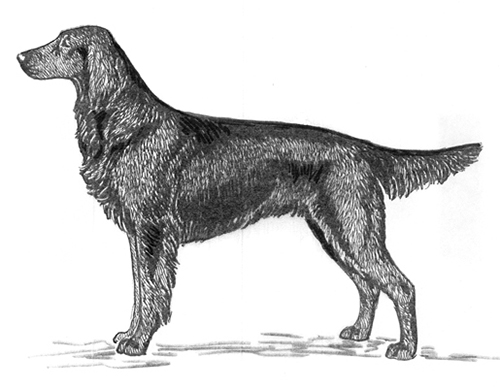Epagneul Bleu de Picardie
Gun Dog Group
The goals and purposes of this breed standard include: to furnish guidelines for breeders who wish to maintain the quality of their breed and to improve it; to advance this breed to a state of similarity throughout the world; and to act as a guide for judges.
Breeders and judges have the responsibility to avoid any conditions or exaggerations that are detrimental to the health, welfare, essence and soundness of this breed, and must take the responsibility to see that these are not perpetuated.
Any departure from the following should be considered a fault, and the seriousness with which the fault should be regarded should be in exact proportion to its degree and its effect upon the health and welfare of the dog and on the dog’s ability to perform its traditional work.
History
The Blue Picardy Spaniel is descended from the old French spaniels that were crossed with blue Belton English Setters and Gordon Setters. The presence of the first black blue/grey coated spaniel was recorded in 1875. In 1921 the Picard Spaniel and Blue Picardy Spaniel Club was formed. The Blue Picardy Spaniel was classified as a separate breed because of its distinctive coat and skin color.
The Epagneul Bleu de Picardie was recognized by the United Kennel Club January 1, 1996.
General Appearance
Quite low to the ground dog, well built for work, a true Picardy spaniel.
Characteristics
Gentle, intelligent and willing to please, very adaptable, and possessing a strong natural hunting instinct.
Head
SKULL
Relatively wide and oval in shape, with a slight occipital crest. The stop is moderate but marked.
Faults: Narrow skull. Lack of chiseling.
MUZZLE
Quite long and broad, with thick, pendulous lips that form a square muzzle in profile.
Fault: Pointed muzzle.
TEETH
The Epagneul Bleu de Picardie has a complete set of evenly spaced, white teeth meeting in a scissors bite.
NOSE
Broad, with well opened nostrils.
EYES
The large, well opened eyes are dark in color, and show a calm expression.
Faults: Light eyes, small eyes.
EARS
Set slightly above eye level, with thick leather that reaches to the end of the nose, the ears are covered with beautiful wavy, silky hair.
Faults: Short ears. Thin leather. Ears set too high.
Neck
Well set. A slight dewlap is permitted.
Forequarters
The shoulder blade and upper arm are slightly oblique.
FORELEGS
Strong and well muscled.
Body
The chest is of medium depth. The ribs are nicely sprung, and descend to the elbow. The back and loin are strong, and not too long. The croup is slightly sloping.
Faults: Flat ribs or barrel ribs.
Hindquarters
HIND LEGS
The upper thighs are well muscled. The lower thighs are long, and well furnished. There is good angulation at the hock, and the rear pasterns are well furnished.
Feet
The feet are round, a little broad, but not flat, and well furnished with hair between tightly closed toes.
Faults: Feet flat, splayed or too broad.
Tail
The tail reaches approximately to the hock joint, and is straight.
Coat
Flat or slightly wavy, with good furnishings on the legs and tail.
Color
Grey/black speckled, which forms a bluish shade, with black patches.
Height and Weight
Height at the withers for males is 22.5 to 23.5 inches; slightly less for females.
Disqualifications
(A dog with a Disqualification must not be considered for placement in a conformation event, and must be reported to UKC.)
Unilateral or bilateral cryptorchid.
Viciousness or extreme shyness.
Albinism.

Looking for a Dog?
Find a dog that will fit your family.
Note: The breeders on this list are not endorsed by UKC.
©Copyright 1996, United Kennel Club
